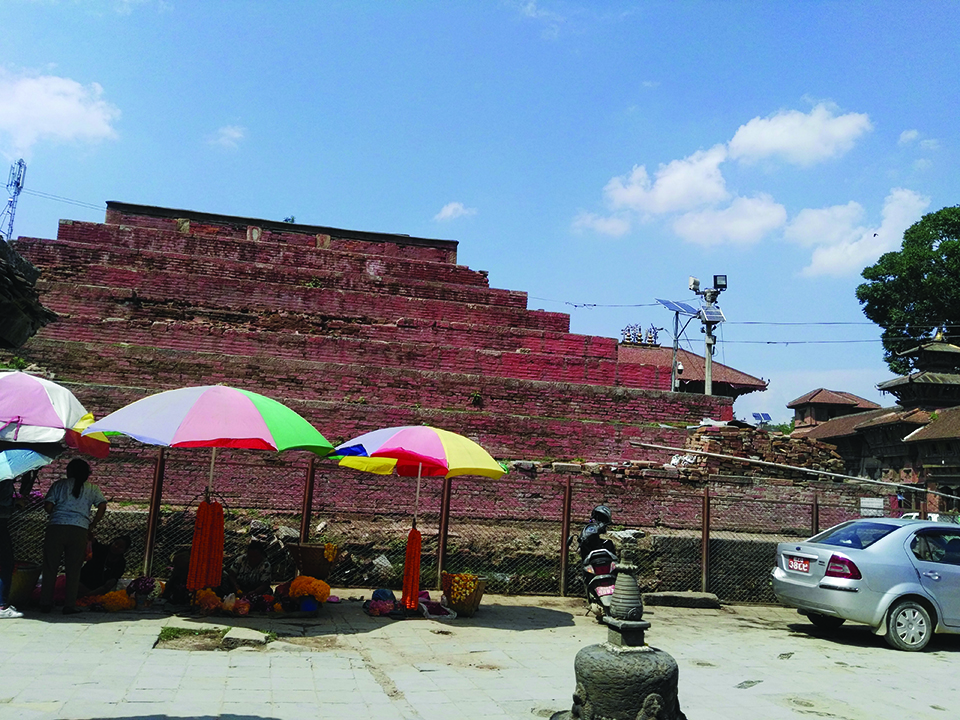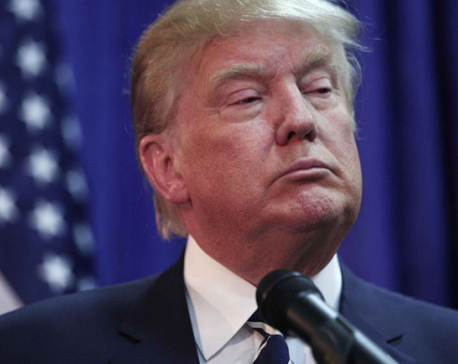
OR

Global trend is only part of the story behind the reemergence of Oliological phenomenon in Nepali politics. There are local factors behind the continuing allure of authoritarianism in the country
The PEON has successfully prevented popularly elected Rastriya Janata Party-Nepal (RJP-N) lawmaker Resham Chaudhary from taking the oath of office. He remains under the custody of federal government. The firebrands of all-party consensus that campaigned for an Undivided Far West—the Akhandis—have ultimately triumphed.
The Akhandis also managed to gerrymander provincial boundaries in such a way that Tharus shall forever be bound to their proper places. The ethno-national campaigners have prevailed in an unambiguous manner. The status quo ante has been re-established and the age-old social harmony between mountains, hills and plains has been restored. Even the mention of Tikapur turmoil of September, 2015 brings a smirk on the face of most Akhandis. It’s all quiet on the Far-Western Front.
There isn’t much happening eastwards across the Karnali River. According to United Nations Office of the High Commissioner for Human Rights, more people were made to forcibly disappear from Bardiya during the royal-military regime after the declaration of State of Emergency on November 26, 2001 than anywhere else in the country. Not even stalwarts of Human Rights Industry in Kathmandu refer to the OHCHR report anymore.
The first Madhes Uprising originally erupted from Lahan in the central Madhesh, but it spread out from Nepalgunj when law enforcement agencies openly sided with the dominant community. Harmony has since been reinstated once again in Banke and Kapilvastu. Madhesis, including Tharus and Muslims, have internalized the fact that accepting hegemony of the dominant community is an inalienable part of surviving in this country.
Tharus and Muslims lost Rupandehi and Nawalparasi to settlers from the hills much earlier than in Chitwan. Some Madhesi landlords made peace with the Gorkhali court and survived exactly the way Hridayesh Tripathi and Brajesh Gupta have done now: By dutifully accepting subservient roles in politics, society and economy of the area. In most of western Madhes, even Madhesi activists have learned to find fault with their own leaders. Self-blame is a clear sign that survivors have lost all hopes of redemption.
Routed resistance
It’s even quieter in most of central and eastern Madhes. Political parties in Province 2 no longer talk about equality and justice; development and prosperity are their new buzzwords. The battle for crumbs rages as losers of the political game fight whether Maithili, Bhojpuri or Hindi should be the secondary language after Nepali and whether the truncated State should claim the legacy of all the three Madhes Uprisings for itself through adoption of an appropriate name.
The politics of dignity—encompassing identity, equality and justice—has lost all support at the grassroots for now. There is reason Premier Khadga Prasad Sharma Oli feels like the master of all he surveys. The primary challenge to the hegemony of the PEON was from Madhes. The Oligarchy that devised the 16-Point Conspiracy (SPC) within few weeks of Gorkha Earthquakes first crushed the third Madhes Uprising and then defamed Madhesi aspirations successfully in order to defuse all chances of future eruptions.
The Gorkhali victors subsumed Janjatis of the hills and mountains into itself soon after the Sugauli Treaty to such a degree that at least the elites among Magars, Gurungs, Rais, Limbus, Thakalis and Newars began to fancy themselves as bona fide members of the Khas-Arya community. Continued supply of ‘short men with stout legs and strong lungs wielding sharp Khukuris’ to the British Empire for over two centuries helped the so-called martial Janjati groups identify itself with amorphous Gorkhali identity.
The renaissance of pride in indigenous identities post-1990s was but a short-lived moment. Bijay Kumar Gachhadar of the-then Madhesi Janadhikar Forum (Democratic) was a representative of all indigenous groups in the SPC settlement. Most Janjati activists lapped up the deal without a whimper when it was packaged and sold as an anti-Indian and anti-Madhesi arrangement.
On the political front, the Khas-Arya chieftain remains even more unchallenged. Putative patriarchs of erstwhile NCP (UML) such as Madhav Kumar Nepal, Jhalnath Khanal or Subhas Nembang have turned out to be paper tigers. In front of heavyweight loyalists of Chieftain Oli such as Mahesh Basnet or Gokul Baskota, youthful ideologues in the league of Ghanshyam Bhusal and Yogesh Bhattarai have proved to be featherweight competitors.
Once Pushpa Kamal Dahal decided to merge his outfit into UML to save his skin, he lost whatever relevance he had in Nepali politics. Chieftain Oli can now easily play favorites with former acolytes of presumptive Chairman Dahal and pit ambitious politicos of lapsed Maoists against their own one-time supremo. Battered by personal tragedies—his one daughter and the only son succumbed to incurable diseases within few years and he is nursing his wife back to health in Singapore—and roundly defeated in the arithmetic of parliamentary politics, Chairman Dahal has been beaten at his own game of shrill demagoguery.
Through its participation in the SPC, the Nepali Congress not only lost its primary support base in Madhes but also surrendered its long-cherished ideals of inclusive democracy. In chauvinistic sloganeering, the main opposition party of the parliament is a rank outsider. Playing on an alien turf, the NC was a loser from the word go and remains largely so to date. Even today, if a popularity contest were to be held for ethno-national chieftaincy, most NC members will prefer NCP (NCP) Supremo Oli over any other leader of their own party.
There is a reason Premier Oli misses no opportunity to heap scorn upon opposition leader and his predecessor Sher Bahadur Deuba. Cut adrift from its moorings, the NC finds itself completely at sea and doesn’t seem to know how to navigate its way back to the shore. Chronic infighting is an unmistakable symptom of a downbeat organization.
Oliological impulses
There are logical and illogical arguments but Oliological impulse of tribalism triumphs over them all. Since it’s primal, tribalism has a raw appeal that few other emotions can match. It’s true that the Trumpards, the Putinistas, the Ximians, the Erdoganists, the Brexiters, the Dutertenians, the Modians or the Orbanians have emerged in reaction to the stranglehold of Davos cosmopolitans on the political economy of liberalization, privatization and globalization.
World over, there is deep resentment against the One Percent leery liberals that discuss relative merits of different tax havens over cucumber sandwiches and green tea even as their favorite oligarchs feast upon cheese, wine and caviar in the name of open markets. Unfortunately, the left-out have opted for rightwing demagogues. But the global trend is only part of the story behind the reemergence of Oliological phenomenon in Nepali politics. There are local factors behind the continuing allure of authoritarianism in the country.
The supply side of demagoguery consists of conspiratorial politics, dominance of coercive instruments and conniving nature of political entrepreneurs endemic to the statecraft in Nepal. Perhaps equally important is the demand side of chauvinism that has deep roots in Nepali society and culture.
The caste hierarchy is inherently anti-democratic. More than malice, it’s the social belief of Chieftain Oli that prompts him into recruiting and promoting only fellow Bahuns to positions of power and prevents him from ceding an inch of political space to the ethnic ‘other’ from among Madhesis, Janjatis, Dalits and even the ‘othered’ of the dominant ethno-national group—the Khas-Arya women.
Fear of losing hegemony is also a powerful factor. Bahuns are terrified that in a truly meritocratic system, Janjatis like Newars and Thakalis and at least some caste groups from among Madhesis will easily pip them to the post. Chieftain Oli reigns supreme because he embodies the greed and fears of hegemonic Hindus of hills and mountains. There is a reason Oliars of the Nepali media and intelligentsia rolled out the red carpet for Chieftain Oli unasked. He tells things about Madhesis and Janjatis that political correctness prevents them from uttering in public.
It’s not easy to ascertain what is happening when nothing is apparently happening. For the dominant community, peace prevails after a decade of ceaseless struggles and steps such as the gag rule and integrity policy are necessary to maintain order. At least some Janjati activists appear under an impression that it’s lull before a storm. Madhesis recognized the deadly calm after the hurricane that swept away their aspirations of dignity.
Contra-Marx, politics is seldom scientific and community always triumphs over class almost everywhere. Only time will tell the true significance of ambient stillness. History sometimes sleeps and then wakes up with a roar before taking a leap into the unknown.
You May Like This

US government shuts down, here's what happens
WASHINGTON, Jan 20: The US Congress are racing to meet a midnight Friday deadline to pass a short-term bill to keep... Read More...

What if the unexpected happens?
What if the unexpected happens, That all the living creature threatens. No recipient to withstand the harm, Extinction of the... Read More...

Bullying happens, talk to your child about it!
I had a hard time at school. I can’t look back at my school days without being sad. I was... Read More...







Just In
- NRB to provide collateral-free loans to foreign employment seekers
- NEB to publish Grade 12 results next week
- Body handover begins; Relatives remain dissatisfied with insurance, compensation amount
- NC defers its plan to join Koshi govt
- NRB to review microfinance loan interest rate
- 134 dead in floods and landslides since onset of monsoon this year
- Mahakali Irrigation Project sees only 22 percent physical progress in 18 years
- Singapore now holds world's most powerful passport; Nepal stays at 98th












Leave A Comment